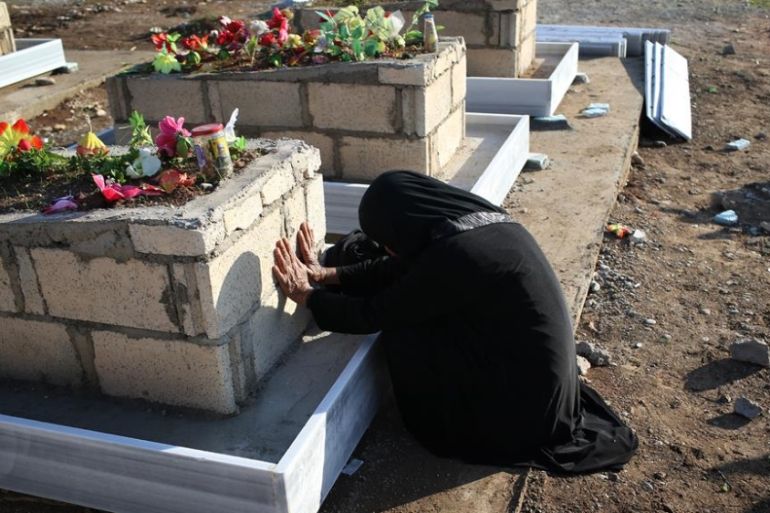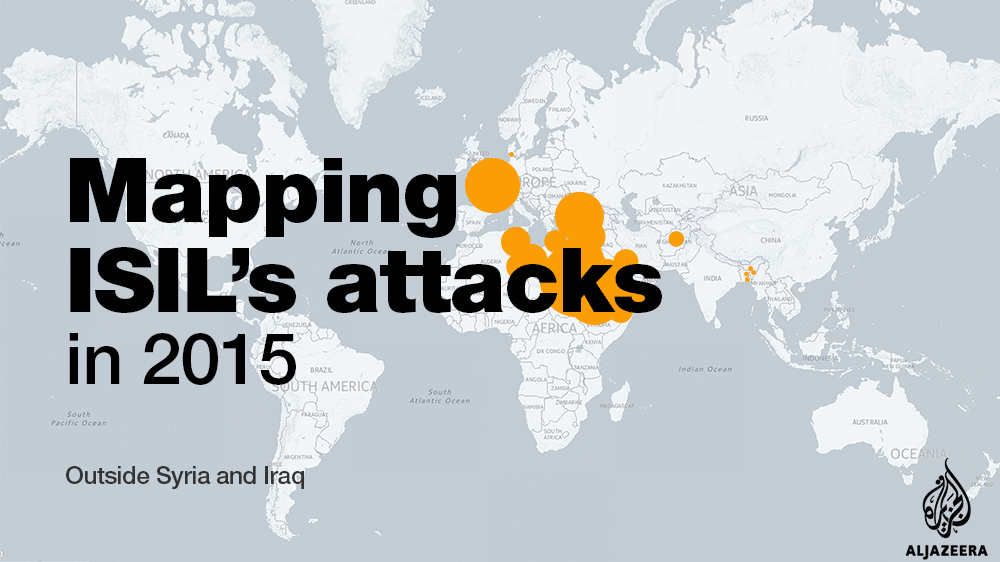Debate about Syria is missing one thing: Syrians
Increasing Western involvement in Syria shifts the conversation further away from the realities on the ground.

The Western intervention in Syria is not aimed at alleviating the suffering of Syrians or addressing the root causes of the conflict, according to a new book by Syrian researcher Samer Abboud.
In the book titled ‘Syria‘, Abboud provides an in-depth analysis of Syria’s descent into civil war. He unravels the complex and multilayered causes of the current political and military stalemate – from rebel fragmentation to the differing roles of international actors, and the rise of competing centres of power throughout the country.
![Samer Abboud [Arcadia]](/wp-content/uploads/2015/09/7f9d734d454e4834bd40e15d44e1606e_19.jpeg)
The immense humanitarian crisis wrought by the civil war in Syria, says Abboud, is often lost in the discussion around the Syrian conflict. Humanitarian conditions are getting worse, not better, as the conflict persists.
Keep reading
list of 4 itemsMoscow theatre attack suspects show signs of beating in court
Four men showing signs of severe beating charged over Moscow concert attack
Russia mourns Moscow concert hall attack victims as death toll rises to 137
“There is such an obsession with the Islamic State of Iraq and the Levant [ISIL] and an irrational fear of Syrian refugees in the West that encourages us to ignore the very real suffering of Syrians who have to live while spectacular and exceptional violence surrounds them,” he said.
Abboud speaks to Al Jazeera on a wide range of issues related to the war in Syria.
ANALYSIS: How to solve a problem like Syria?
Al Jazeera: How do you view the expansion of the coalition fighting ISIL to include France, Russia and potentially Germany and the UK?
Samer Abboud: While there seems to be international consensus around confronting ISIL and in the utility of military force to do so, the growth of the coalition fighting ISIL to include Russia, France, and potentially Germany and the United Kingdom, is not a positive development in the Syrian conflict.
The expansion in the number of countries bombing Syria further internationalises the conflict and creates more layers to this already complicated and multilayered conflict.
|
The Western insistence on isolating ISIL as the problem in the Syrian conflict ignores the central problem of the regime’s persistence and its infliction of brutal,incomprehensible violence on Syrians. |
Most troubling, however, is that the increase of Western involvement in Syria shifts the conversation in the West about the Syrian conflict further away from the realities on the ground towards a framing that is remarkably consistent with that of the Russians, Iranians, and the Syrian regime, mainly, that this is a conflict between the regime and ISIL and the rest of the groups are essentially bystanders.
Nothing could be further from the truth. The Western insistence on isolating ISIL as the problem in the Syrian conflict ignores the central problem of the regime’s persistence and its infliction of brutal, incomprehensible violence on Syrians.
Abboud: When France began its bombing campaign against ISIL in retaliation for the Paris attacks, its targets included a medical clinic and an uninhabited forest.
One wonders why these were chosen as targets. Until recently, ISIL oil facilities and transport convoys were not targeted, but this has now changed with French attacks aimed at severing an important, although not essential, economic lifeline.

Al Jazeera: So how would you account for ISIL’s survival, in spite of the relentless bombing campaign?
Abboud: ISIL’s ability to remain a major player in the Syrian conflict is not necessarily a sign of the group’s strength but in the weaknesses of the other armed groups in Syria fighting ISIL.
More importantly, the group’s strength reflects the reality that they are not a conventional target with bureaucratic buildings, industrial areas, military barracks, and so on that a sustained aerial campaign could undermine.
There is no institutional or economic heartland that a bombing campaign could destroy that would have an immediate impact on the group’s ability to capture and retain control of territory.
The aerial campaigns also avoid the heart of the problem, which is the material and ideological structure that sustains ISIL. This is not the space to elaborate on the ideological background of ISIL and how this sustains recruitment and brings in needed material resources.
These resources help sustain the group in immeasurable ways and provide both the military and economic means of ensuring their continued ability to control territory.
![The resources that sustain ISIL are not immediately undermined by aerial campaigns [AP]](/wp-content/uploads/2015/09/b60187ca1208494d8ddc9337974cf75c_19.jpeg)
ISIL does not acquire its wealth through large-scale development projects, nor is there a robust productive capacity in ISIL-controlled areas that is connected to regional markets.
Most of their material resources come from donations and support from regional actors as well as a sophisticated system of predatory economic activity that encourages the group’s fighters to loot and tax the Syrian population to acquire the resources to sustain their activities.
While many observers seem to believe that oil plays a huge role in ISIL’s finances, this is not necessarily the case. Oil production and transport, especially when crossing across different conflict lines, is remarkably difficult and expensive and does not provide the abundant funds many people assume it does.
How can a bombing campaign undermine the material basis of ISIL when so much of it is structured around predatory behaviour?
Let us not also forget that, for the most part, ISIL’s military strength is based on small arms. Targeting supposed training centres certainly impacts on recruitment and retention of fighters but it does not undermine existing capacities.
The reliance on small arms means that ISIL has expanded in Syria with relatively limited resources. Moreover, as we have seen in the attacks of the past two months, including the use of an improvised pop can as a bomb placed on the Russian plane [which crashed] in Sinai, ISIL relies on limited resources that are not susceptible or vulnerable to aerial bombardment.
It is, quite simply, a group that can survive and still capture and retain territory amid sustained aerial attack.
This is partly because ISIL does not control major population centres and, with the exception of Palmyra, is not connected to the major supply routes linking different parts of the country or the northern regions to the Turkish borderlands that economically sustain non-regime areas.
ISIL has been able to survive because it has a sophisticated recruitment and retention system, functioning supply lines, and armed fighters who can wreak havoc and terror among the population, all the while facing weak groups on the ground.
All this is to say that the resources that sustain ISIL are not immediately undermined by aerial campaigns.
OPINION: Can anyone stop the killing in Syria?
Al Jazeera: In your view why does the West insist on going ahead with even more bombings when it has not solved the problem that is ISIL?
Abboud: The renewed Western appetite for intervention in Syria against ISIL is most obviously linked to the desire for immediate retribution for the Paris attacks and the need to appear as responsive to the growing threat posed by ISIL.
The geographic expansion of the Syrian battlefield deep into Europe’s borders, coupled with the continued backlash against Syrian and other refugees, has compelled European leaders to commit to military intervention in Syria’s conflict.
Unfortunately, one would have hoped that the Paris attacks would induce a moment of deeper political reflection on the efficacy of the bombing campaign already being waged by a US-led coalition that began in August 2014 or that started by the Russians in late 2015.
These bombing campaigns have not solved the ISIL problem, and so we are left to wonder why the Western insistence on even more bombing, without any identifiable strategic plan beyond that, is somehow going to work in 2016.
Such enthusiasm for intervention in Syria that narrowly targets ISIL represents a very problematic understanding of the conflict.
It is clear to everyone that the Western intervention is not aimed at alleviating the suffering of Syrians or addressing the root causes of the conflict but, rather, to pursue their very narrow interests in containing and eliminating ISIL.
The refusal to see the broader landscape of the conflict and how ISIL fits into this will only perpetuate the military and political conditions that are driving the current stalemate.
Al Jazeera: Do Western powers want to change the situation on the ground to be able to influence a deal when it is time for negotiations?
|
|
Abboud: This was certainly the case when Russia began its large-scale intervention in Syria in October.
The choice of Russian targets and the inclusion of ground forces all suggested that the Russians were trying to create new realities on the ground from which to negotiate a favourable political solution.
By targeting Free Syrian Army and Jabhat al-Nusra-affiliated brigades, the Russian intervention was weakening the regime’s principal military adversaries and isolating ISIL.
However, now that France and Russia have begun coordinating, and that this coalition will likely include Germany and the UK in the future, the calculations have shifted for all countries involved.
Despite the agreement over the need to bomb ISIL, France and Russia vehemently disagree about the contours of a political transition and the role that Bashar al-Assad would play in such a process.
Thus, we should not assume that coordination in the air would lead to coordination at the negotiating table.
But here is where the conflict seems even more complicated. Western states and Russia agree on the strategy of confronting ISIL through aerial bombardment, but they do not agree on much else.
What is apparent, however, is that the Western states have implicitly accepted the Russian understanding of the Syrian conflict and the need for military confrontation with ISIL and not the Syrian regime.
Such developments only serve to advance Russia’s narratives of the conflict.
!['Why does the West insist on more bombing without any identifiable strategic plan beyond it?' asks Abboud [Getty Images]](/wp-content/uploads/2015/11/1f022ad7248f4ea6a8bb9a38aec69bf3_18.jpeg)
|
|
Al Jazeera: So what are the key obstacles to advancing to the negotiation table?
Abboud: There are two developments that will prove to be obstacles to any sort of political negotiations. The first is that it remains unclear how negotiations could occur in the context of a sustained aerial campaign when the only obsession of Western states seems to be to eliminate ISIL and not address broader political issues related to the resolution of the conflict.
The international actors active in the Syrian conflict have consistently placed military solutions above political ones. The deepening of Western military intervention will only serve to further legitimise the military solution as a means of ending the conflict.
The second development concerns the Russian-Turkish tensions after the downing of a Russian fighter jet by Turkish planes.
The Russians have reacted very negatively to this and, in addition to imposing economic sanctions on Turkey, have deployed sophisticated S-400 anti-aircraft missiles in Syria.
This immediately led the US and Turkey to declare that they would no longer conduct operations within range of the missiles, giving Russia de facto control over Syrian skies.
The fallout from the downing of the Russian fighter jet is unlikely to end here and could lead to much deeper tensions between the two countries.
Under such conditions, it is unlikely that they would want, or even be capable of, finding common ground at the negotiating table.

Al Jazeera: Can you elaborate a little bit about your book?
Abboud: My book is an introduction for readers who wish to understand some of the historical background of the Syrian conflict and some of the reasons behind its trajectory since protests broke out in 2011.
I am particularly interested in introducing readers to ideas around how the conflict arrived at the current military and political stalemate and how fragmentation of both the opposition groups and the country’s geography are fuelling the stalemate.